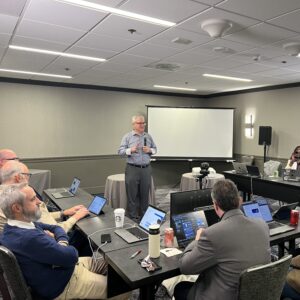|
|
 Stephen Foskett lead a delegate roundtable discussion at Cloud Field Day 21 |
Cloud Repatriation and Rationalization – Cloud Field Day 21 Delegate Roundtable Discussion
Watch on YouTube
Watch on Vimeo
The roundtable discussion at Cloud Field Day 21 centered around the growing trend of cloud repatriation, where companies are considering moving workloads from the cloud back to on-premises environments. The delegates discussed the reasons behind this shift, with cost being a primary driver. Many organizations initially moved to the cloud during the COVID-19 pandemic due to the need for remote access and scalability. However, as businesses return to more traditional operations, they are reassessing the financial implications of cloud services, especially when unexpected operational expenses arise. The unpredictability of cloud costs, particularly in OPEX models, has led some companies to reconsider whether certain workloads are better suited for on-premises infrastructure, where they feel they have more control over expenses.
Another key point raised was the evolution of technology and operational models. While many applications were initially lifted and shifted to the cloud, not all of them are optimized for cloud environments, leading to inefficiencies and higher costs. The delegates noted that newer applications, especially those designed to be cloud-native, are likely to remain in the cloud, but legacy applications may be better suited for on-premises environments. Additionally, the conversation highlighted how cloud operational models, such as automation and elasticity, have been adopted in on-premises environments, blurring the lines between cloud and traditional data centers. This shift in operational models has made it easier for companies to repatriate workloads without losing the benefits of cloud-like flexibility.
The discussion also touched on the broader implications of repatriation, including the role of financial models and the importance of aligning technology decisions with business needs. The delegates emphasized that repatriation is not just a technical decision but also a financial one, driven by the need to balance CAPEX and OPEX. They also pointed out that the decision to repatriate should be based on the specific workload and its requirements, rather than a blanket move away from the cloud. Ultimately, the conversation suggested that cloud repatriation is a nuanced topic, with companies needing to carefully evaluate their workloads, costs, and operational models to determine the best approach for their infrastructure.
Personnel: Stephen Foskett
Automation Is Overblown – Cloud Field Day 21 Delegate Roundtable Discussion
Watch on YouTube
Watch on Vimeo
The roundtable discussion at Cloud Field Day 21 delved into the complexities and implications of automation, particularly in the context of cloud computing. The delegates acknowledged that while automation can streamline tedious or dangerous tasks, it also has significant social and economic impacts. Automation has historically displaced workers, and the conversation touched on the ethical considerations of who controls the automation process. The example of CNC milling machines was used to illustrate how automation can shift control from skilled workers to management, often resulting in job losses or reduced wages. The delegates emphasized the need to be mindful of the human element in automation, ensuring that workers are not left behind in the transition.
In the context of cloud computing, automation is seen as essential due to the rapid pace of change and the complexity of managing cloud environments. Automating routine tasks allows cloud professionals to focus on higher-value work, but it also introduces risks. The discussion highlighted the fragility of automated systems, which can fail catastrophically if not properly managed. The delegates shared personal experiences of how automation, when done thoughtfully, can drastically improve efficiency, such as reducing ticket queues for IT teams. However, they also noted that automation should not be implemented blindly; it requires careful consideration of what tasks should be automated and how to maintain quality control.
The conversation also touched on the broader societal implications of automation, including the need for upskilling workers to adapt to new technologies. The delegates agreed that automation is inevitable, but it should be approached with caution and a focus on human oversight. They discussed the importance of maintaining a balance between technological progress and the well-being of workers, suggesting that automation should empower people rather than replace them. Ultimately, the roundtable concluded that while automation offers significant benefits, it also comes with risks that must be carefully managed to avoid unintended consequences.
Personnel: Stephen Foskett









